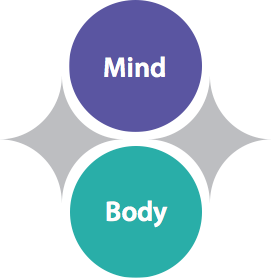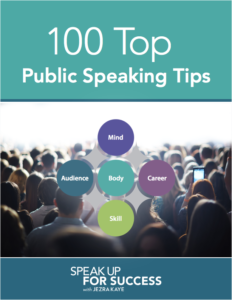 My mom (shown below in 2006 with eight of her nine grandchildren) used to say that the most important thing about any problem was how you coped with it.
My mom (shown below in 2006 with eight of her nine grandchildren) used to say that the most important thing about any problem was how you coped with it.
As the survivor of a cerebral aneurysm, a three-month coma, uterine cancer, two strokes, and early widowhood, Mom knew what she was talking about. But it turns out that her words are also true for public speaking.
In a New York Times article on how we handle pressure, Po Bronson and Ashley Merryman write that,
Studies that compare professionals with amateur competitors — whether concert pianists, male rugby or female volleyball players — show that professionals feel just as much anxiety as amateurs. The difference is in how they interpret their anxiety. The amateurs view it as detrimental, while the professionals tend to view stress as energizing. It gets them to focus.

Public Speaking Stress Means Nothing, Except that You’re Stressed
While I wouldn’t go so far as to call public speaking stress “energizing” — that’s certainly not how I feel when it strikes me! — it is a normal, and neutral, fact of life.
It can energize or enervate. It can motivate or intimidate.
But one thing stays true: The level of stress that you feel says nothing about your public speaking skills, or about your value to an audience.
If you do everything you can to prepare and practice your remarks, and to connect with your audience as you deliver them, you’ll probably give a great speech — in spite of, or maybe even because of, the stress you feel!
Stress Can Make You a Better Public Speaker
I said above that public speaking stress, or fear, mean nothing; but that’s not quite true. The one thing they reliably mean is that you care about doing a good job.
As you gradually realize the truth of this, you’ll also learn how to convert the potentially disruptive energy or stress into positive energy that fuels your efforts. And though you may wish that you could skip that whole process and just be stress-free right now, that really wouldn’t be a good thing.
Here’s how psychologist Alison Poulsen explains it in her excellent post on performance anxiety:
Think of how little anxiety you experience when you are sitting comfortably on your couch at home watching TV. Now imagine that you are going to perform a concert, give a speech, compete in a tournament, or go on a date. Would you want to be as stress-free as you are in front of the TV? Or would a totally relaxed, lackadaisical attitude hurt you?
You’re probably thinking “it would hurt me to be too relaxed.”
But knowing that doesn’t make it easier to cope with stress. You have to have specific tricks up your sleeve, and preferably tricks that align with your Public Speaking Personality.
Your Public Speaking Personality Can Help You Cope with Public Speaking Stress
If you’re new to this blog, Public Speaking Personalities are high-level descriptions of how people prefer to operate in the world.
While nobody fits entirely into one description — we all have bits and pieces from all of them — most people find that one Personality is a better overall fit than the others. And knowing which Personality best describes you can be key to unlocking your public speaking potential.
Based on which Personality you choose, here are some useful ways to look at public speaking stress:
- IF YOU’RE A RESPONSIBLE (also known as Guardians), you feel a strong sense of duty, and take pride in meeting your obligations. To combat public speaking stress, focus on the commitment that you’ve made to your organization and your audience. Would a bad cold send you running in the opposite direction? Of course not; and neither will the stress or fear that you’re feeling. People are counting on you, so do what it takes to fulfill your promise; then you can look back on a job well done.
- IF YOU’RE A HELPER (also known as Idealists), you’re inspired by the chance to help others achieve their dreams. To combat public speaking stress, focus on the possibilities that your speech may unlock for your listeners. Would you turn down a friend who needed help because you weren’t feeling your best? Of course you wouldn’t. So don’t disappoint this audience. Concentrate on their needs, not your own discomfort, and use your skill at making human connections to give them the presentation they deserve.
- IF YOU’RE AN IMPROVER (also known as Rationals), you value logic and competence. To combat public speaking stress, focus on the changes your speech might generate. Would you pass up a chance to tweak a particular system because you weren’t feeling completely confident? Of course not; so don’t pass up this chance to share the powerful thinking you’ve done, and the breakthrough conclusions you’ve reached with people who might just be smart enough to apply your insights.
- IF YOU’RE AN EXPERIENCER (also known as Artisans), you’re a person who wants to live fully in the moment. Fortunately, this moment of discomfort is about to pass, and you’ll be in your element, sharing your concrete experience with other people. Focus on your game plan — both because that will remind you that you know what you’re doing, and also because you’re more likely to stick with the “script” if you think about it now — and when you get onstage, focus on your audience, and be in the moment with them.
And one more tip for everyone:
Public Speaking Stress is Like Having a Headache
Think of public speaking stress like you would a minor headache: It’s annoying, it’s distracting, and it’s a damned shame, but so what!?
Take two mental aspirins and go about your business.
And, whatever your Public Speaking Personality, remember that public speaking stress:
- Doesn’t mean anything, except that you care about doing a good job;
- Doesn’t reflect on your skill, strength, preparation, or worth; and
- Doesn’t have the power to stop you from doing your best.
Ironically, because public speaking stress helps you focus on the job at hand, you may even do a better job than if you were stress-free!

 Buy 100 Top Public Speaking Tips: The Book!
Buy 100 Top Public Speaking Tips: The Book!
In 25 years of speaker coaching, I’ve helped my individual speaker coaching clients develop their strengths and skills to become authentic and effective communicators.
Along the way, I’ve developed tips for everything from small talk to speaking up in meetings, from managing fear to making an impact.
And now, I’ve shared it all in 100 Top Public Speaking Tips: The Book. This beautifully designed PDF booklet is searchable, clickable, and categorized, so that you can find what you need, instantly.
